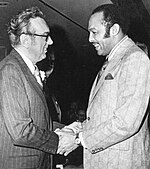Ralph J. Perk
| Ralph Perk | |
|---|---|

Former Cleveland Mayor Carl B. Stokes (right) "passes the torch" to Mayor-Elect Ralph J. Perk (left) in 1971.
|
|
| 52nd Mayor of Cleveland | |
|
In office 1972–1977 |
|
| Preceded by | Carl B. Stokes |
| Succeeded by | Dennis J. Kucinich |
| Personal details | |
| Born |
Ralph Joseph Perk January 19, 1914 Cleveland, Ohio |
| Died | April 21, 1999 (aged 85) Westlake, Ohio |
| Political party | Republican |
| Children | Ralph J. Perk, Jr., Thomas Perk, Kenneth Perk, Allen G. Perk, Richard Perk, Michael Perk, Virginia Perk |
| Occupation | Politician, lawyer |
Ralph Joseph Perk (January 19, 1914 – April 21, 1999) was an American politician of the Republican Party who served as the 52nd mayor of Cleveland, Ohio.
Perk dropped out of high school at age 15, later taking correspondence courses to earn his high-school diploma. He studied history, political science and mathematics at the Cleveland College of Case Western Reserve University and St. John's College in Cleveland. During the Great Depression he worked as a patternmaker, then joined his brother George in operating the Perk Coal & Ice Company. He went on to work in real estate, but returned to patternmaking during World War II to aid in the war effort, after each branch of the military rejected him because of past problems with kidney stones.
During his later service on the Cleveland City Council, Perk founded the American Nationalities Movement, an umbrella agency for 35 nationality groups.
Beginning in 1953, Perk was elected to five two-year terms on the Cleveland City Council from the city's Ward 13. In 1962, he was elected auditor of Cuyahoga County, the first Republican to win countywide office since the mid-1930s; he was re-elected in 1966 and 1970. In 1965 and 1969, Perk ran for mayor of Cleveland and was defeated both times in the general election. In 1971, Perk won the Republican nomination for mayor for the third time. He defeated future mayor, governor, and U.S. Senator George Voinovich, then a member of the Ohio House of Representatives, in the primary. Perk went on to win the general election and was reelected in 1973 and 1975. In 1977, however, Perk suffered an upset defeat in the non-partisan primary for mayor, finishing third behind Dennis Kucinich and Edward F. Feighan. (Kucinich prevailed over Feighan in the general election).
...
Wikipedia
